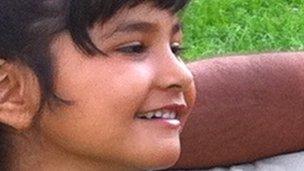Portsmouth mum's hope of cure for daughter with Rett syndrome
- Published

Harriet lost her ability to walk and talk and needs constant care
A Hampshire woman whose daughter has a rare degenerative disease is trying to raise awareness of the condition in the hope of finding a cure.
Six-year-old Harriet Phillips has Rett syndrome - a debilitating disorder which mainly affects girls - and needs constant care.
Her mother Kelly is desperately trying to raise funds because she believes a cure could be just around the corner.
Last year she raised £30,000 for the Rett Syndrome Research Trust.
She said: "Harriet is our third child - we brought her home from the hospital - she progressed normally and at 18 months she took a downward spiral and lost a lot of her skills.
"I think until you get to about one-and-a-half or two, children do develop at different rates and so you can't be too competitive but time just tells you something is not quite right."
Now Harriet attends a special school but is unable to walk, speak or pick things up.
Mrs Phillips said: "It was devastating when this happens, suddenly you enter a whole new world where you have to adapt and change.
'Disorder reversed'
"The good thing for us is that there are a lot of children with severe disabilities who don't have a diagnosis so that's almost worse.
"For us, while Rett's condition is really devastating, we have a lot of hope - we know potentially how to fix the condition."
The disorder is caused by a gene called MeCP2, which makes a protein necessary for normal brain function.
Scientists working for the Rett Syndrome Research Trust replicated the condition in mice by genetically engineering a switch which turned the protein off.
The mice developed Rett symptoms but when the protein was 'switched on', the mice immediately became healthy and were able to function normally - the disorder had been reversed.
Rachael Bloom, executive director of the trust, said the implications of the discovery could be far reaching in terms of treating neurological disorders.
In between caring for her daughter Mrs Phillips has organised sponsored walks, jumble sales and coffee mornings from her Portsmouth home to raise money for research.
She said: "We know what's broken and Rett Syndrome Research Trust do have a plan to make this the first reversible brain disorder. For me that softens the blow slightly.
"I think the worst thing is knowing your daughter has no brain damage and knows what's going on but she can't even hold a cup to her mouth and you know that could be fixed and the only thing stopping it is funding."